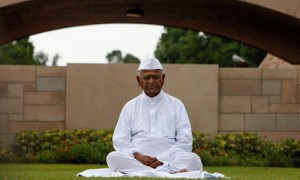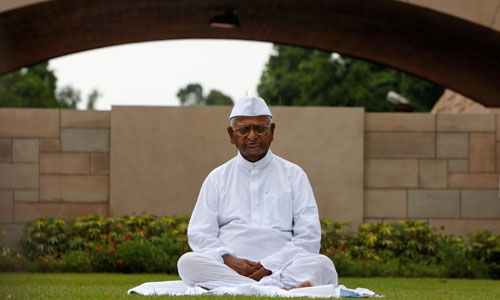By: Ravi Sinha
Track2Realty Exclusive
 Has Anna Hazare’s so-called anti-corruption crusade got any impact on the real estate? Well, the question may seem to be borne out of cynicism, but wait. There is an impact, both in the short term as well as long term. A section of the real estate developers have already announced their pledge to not to pay any bribe to the government officials for getting their projects’ mandatory clearances.
Has Anna Hazare’s so-called anti-corruption crusade got any impact on the real estate? Well, the question may seem to be borne out of cynicism, but wait. There is an impact, both in the short term as well as long term. A section of the real estate developers have already announced their pledge to not to pay any bribe to the government officials for getting their projects’ mandatory clearances.
However, this sudden spurt of morality is a doubtful starter and privately many of the developers admit it is just the PR gimmick to make sure the sector is not seen as corrupt as the collective consciousness believes it to be.
The gathering storm of the Anna Hazare movement against corruption may hurt the real estate developers the most in the long run. Real estate is the most corruption-prone sector of them all, with politicians, builders, and criminals involved in the ownership, development and manipulation of realty supply. Any effective Lokpal will have implications for the politician-builder nexus, and, by extension, for the future of the realty.
After all, the real estate sector, in particular, has been at the heart of several scandals that have erupted in the recent past. The Noida Extension land grab (in which the Greater Noida Industrial Authority hoovered huge tracts of fertile land on the pretext of setting up industries and then used those plots for residential use); the illegal iron ore mining scandal in Karnataka and the Adarsh Housing Society scandal (in which apartments in a cooperative society reserved for war widows and veterans of the Kargil war were handed out to politicians, bureaucrats and army personnel who had nothing to do with the Kargil war) are just some of the more recent examples.
More recently, Anna Hazare targeted Sharad Pawar for being part of the Group of Ministers to draft the Lokpal Bill. Pawar, who is widely seen as linked to many land scams, opted out of the GoM after that.
Most people readily accept the generalisation that most real-estate developers are a corrupt and money-grubbing bunch. And the cartelisation, and the nexus between politicians and developers, makes buyers very wary of dealing with such companies.
In July, the BBC carried a report on India’s property market, pointing out that buying a home, or building one, was a frightening prospect for many home buyers because of the possibility of getting involved in legal battles in the clogged up court system.
It also recounted the nightmare situation of one hapless family that had bought land, only to later discover that they had no control of it and couldn’t build on it. The agent who had sold the land to the family had lied about having the power of attorney on behalf of the villagers, who allegedly sold the land. The agent made off with the money and both the family and the villagers lost out.
In other cases, properties are delivered late or worse, abandoned half-built, the report said.
There are, no doubt, hundreds of such horror stories. Because a lot of the developers are protected by politicians, very few of them are ever brought to justice.
Can the real estate sector expect a face lift post Lokpal Bill? Well, its anybody guess. Still, in this season of scandals, it feels like a small victory for the common man and the sector wants to be a party to this overt morality. However, the real estate, like the politicians, bureaucrats and the Common masses, may fancy with the Lokpal Bill, the proposed legislation only seem to corner everybody’s collective wish list to a mirage.





